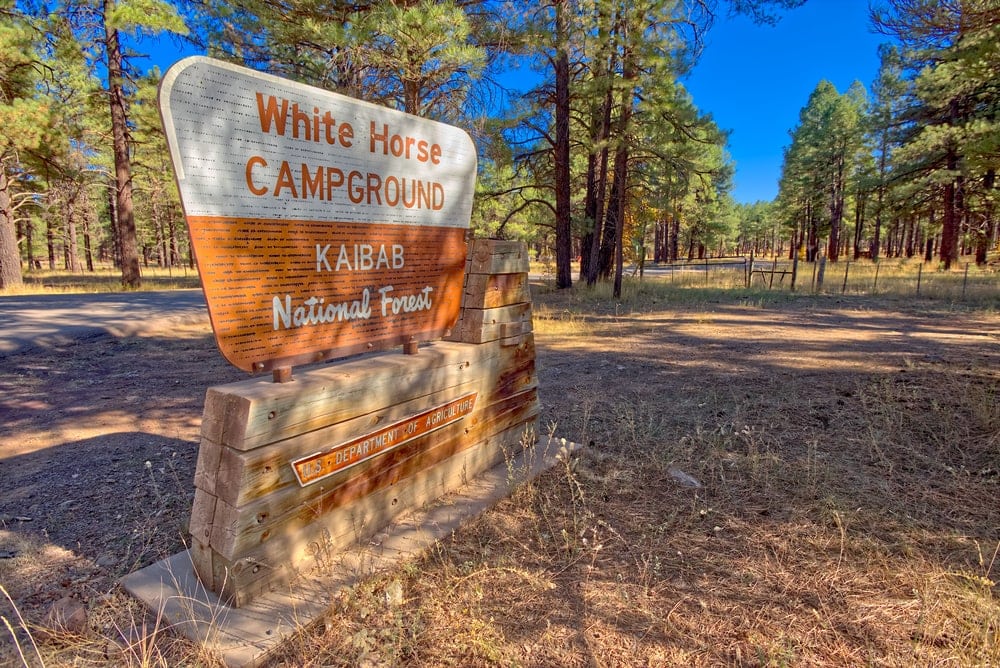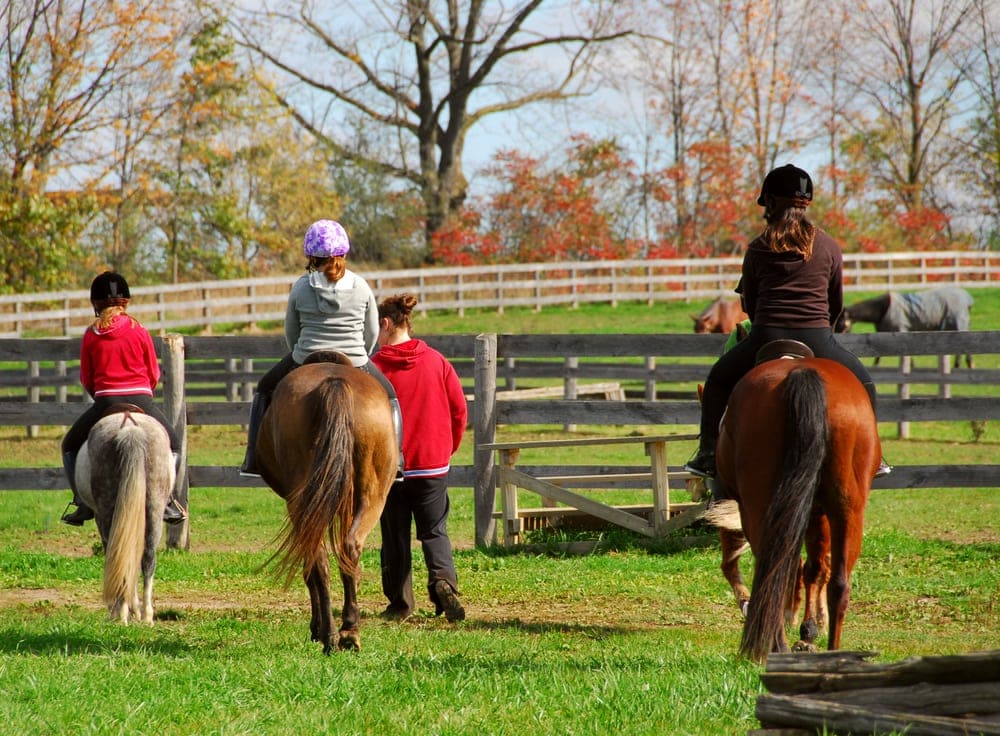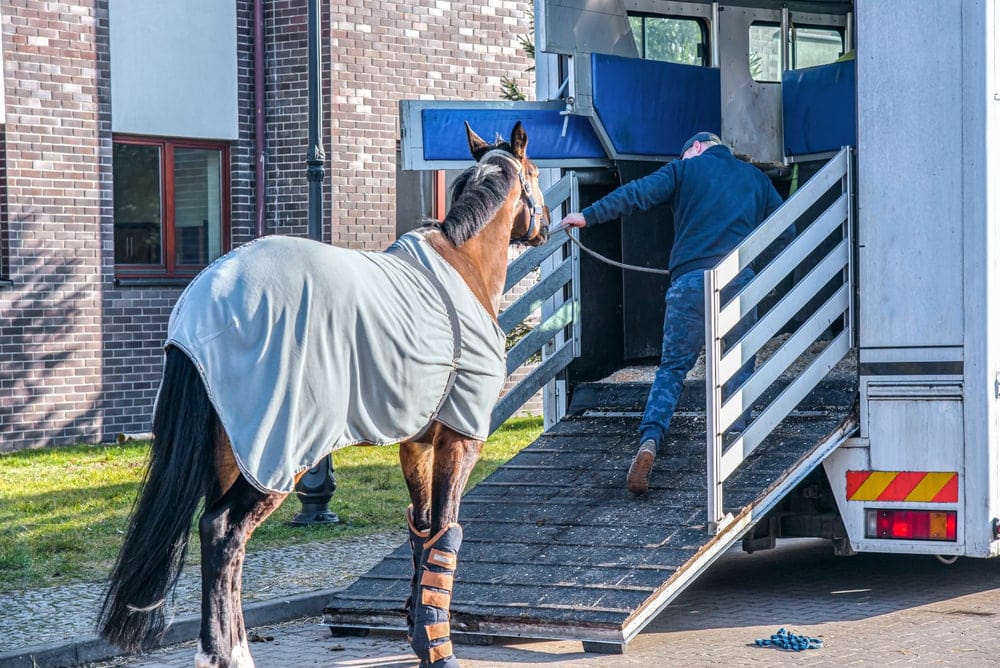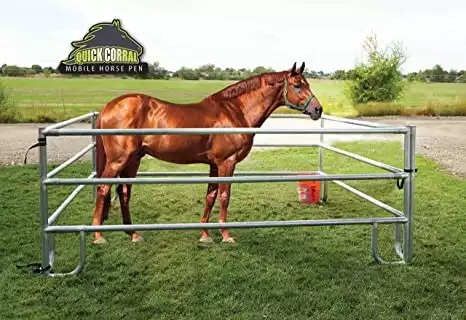If you love horses, the idea of equestrian camping will surely intrigue you.
This type of camping refers to camping with your horse! It can take various forms and there are many equestrian campgrounds of which you can enjoy.
What are examples of equestrian camping?
While it’s natural to assume that camping with your horse would involve rustic and remote grounds, this isn’t always the case. You can find campgrounds that offer horse trainers and other facilities.
With that in mind, here’s everything you need to know about equestrian camping. Get ready to spend time bonding with your beloved horse.
Equestrian Camping: What Activities Are Allowed?

One of the first things you’ll want to know about equestrian camping is what types of activities you and your horse will be able to get involved in.
The good news is that there are tons of different activities and facilities on offer. These include horseback riding hilly or wooded trails in the outdoors, and kids horse camps.
Here are some of the best equestrian campgrounds to consider if you want to go equestrian camping.
Brown County State Park
Located in Nashville, Indiana, this campground has both primitive and established campsites. You and your horse will love the 70 miles (112 km) of bridle trails that offer steep and forested hills. It’s the perfect way to get back in tune with nature without missing out on riding your horse.
Mueller State Park
If you love having views of the beautiful mountains, equestrian camping in Mueller State Park in Divide, Colorado, is a good choice. It offers two campsites that cater to both RV camping and tent camping. You’ll be able to use various facilities to make your stay more comfortable, such as a dump station and bathroom facilities.
Montana De Oro State Park
This state park, located in California, has many beautiful horse trails, such as Hazard Peak Trail, that will enable you to explore the bluffs while making your way through aromatic eucalyptus trees. There are three horse campsites available and two group horse campsites. It’s been said to be quiet and spacious, with easy walks to the beach.
Alafia River State Park
Located in Florida, this state park offers the most diverse landscape, such as 20 miles (32 km) of hilly trails that you’ll love exploring with your horse. There are 12 campsites located at the park for equestrians and you’ll get amenities such as electrical and water hookups as well as bathroom, picnic, and amphitheatre facilities.
It’s a great place to go camping if you’re also keen on trying other activities, such as riding or hiking – it boasts some of the best mountain bicycling terrains in the whole state.
Green Valley Falls
This campground is part of the Rancho Cuyamaca State Park in California and offers 15 horse campsites. These can accommodate two horses and eight campers, so they’re perfect for you if you’re traveling in a group.
Amenities include flush toilets, potable water, pay showers, and even camp furniture to make your stay a bit more comfortable. You’ll love enjoying the horse trails that take you through open meadows and oak woodlands.
If you’re looking for privacy during your stay, you’ll be glad to know that many of the campsites have thick brush around them.
Tips For Beginner Equestrian Campers

If you’re raring to start your equestrian camping adventure but you’ve never tried it before, you’ll want to have important tips and advice at your disposal.
Here are some things to know about camping with your horse.
Start With A Shorter Trip
If you’re going on your first equestrian camping trip, it’s a smart idea to book a really short trip, like one that’s an overnight stay at a campground. This will help you to experience it in a more manageable way and see how your horse reacts in the unknown territory.
Bring Your Own Water And Feed
Some equestrian campgrounds follow the rule that horse owners need to bring food and water for their horses. It’s good to get into the habit of bringing these supplies with you, and it will also ensure your horse is comfortable.
Some horses won’t drink any water that tastes different from what they usually have at home, so make sure you bring enough water from home.
It’s also a good idea to follow the same feeding rules that you usually do at home so that you don’t break your horse’s routine, which can lead to digestive issues.
Make Sure Your Horse Can Carry Your Gear
Don’t overpack your horse during your equestrian camping experience. It’s worth noting that the general rule is to pack your horse with a maximum of 175 (79 kg) pounds for strictly dead weight and 250 pounds (113 kg) for the gear, saddle, and yourself.
Get A Trailer

How are you going to transport your horse to the campground? You’ll need a trailer that is safe, comfortable, and secure for your horse. Some of the best horse trailer brands include Featherlite, Sundowner, and 4 Star.
When choosing a horse trailer, look for one that provides enough light and space in the trailer. You want your horse to be able to spread its four legs on the floor while having enough space to use its head and neck for balance.
Get Your Horse Used To Camping
Your horse can easily be spooked by a variety of things that will make their presence on a regular basis during equestrian camping. For example, there could be flapping flags, ATVs, and bicycles on the campgrounds. It’s therefore a good idea to try to expose your horse to these unusual things before your trip so that they’ll be used to them.
Let Your Horse Have Creature Comforts
It’s a good idea to bring bedtime and other comforts that your horse loves at home. These can include warm blankets, as well as any buckets that your horse uses at feeding time. When things are familiar, your horse will be more likely to settle in, which will also help you to get some sleep.
Familiar items in the form of their regular feeding buckets won’t just make your horse feel more at home in unfamiliar surroundings but will prevent your horse from being exposed to bacteria and parasites in the buckets that are provided by the campground.
Know How To Securely Contain Your Horse
You should find out what the stables will be like ahead of your trip. Fixed stalls are considered to be the safest, but make sure you check the stall for any broken boards or nails that could harm your horse when you get there. Here are other important things to know about containing your horse during your camping trip:
- Some campgrounds will provide stalls and corrals, but if this isn’t the case you’ll have to ensure that you bring portable, lightweight corrals as these are a convenient option.
- Heavy-duty steel and portable horse corral
- Creates a strong and stable safe horse stall
- While electric fencing might seem more secure, these should only be used with seasoned horses.
- If you’re going to be tying your horse, you should ensure your horse is comfortable and familiar with being tied. You should use a knot or clasp that’s easy to untie. It’s a good idea to carry a knife with you when you’re at the campground so that you can quickly release your horse if required. Bear in mind you should only tie your horse to a tree for short rest stops or when you’re setting up your camp.
Related Questions
How to ward against pushing your horse too hard on trails?
Check for symptoms in your horse like excessive sweating, labored or heavy breathing, or lagging behind the other horses.
Rest your horse for about 15 minutes, then check its pulse. If it’s elevated, it’s a sign your horse is overexerting itself and needs a rest.
How much does it cost to stay at an equestrian campground?
If the campground offers basic accommodation, this can cost approximately $30 per night .
Conclusion
Equestrian camping offers many benefits for horse owners and their precious horses, but it also requires a bit of planning to ensure that the camping experience is fun for you and your stallion or mare.
Once you’ve ensured you have everything you need and you’ve chosen the best place to go equestrian camping, it can be the experience of a lifetime.









